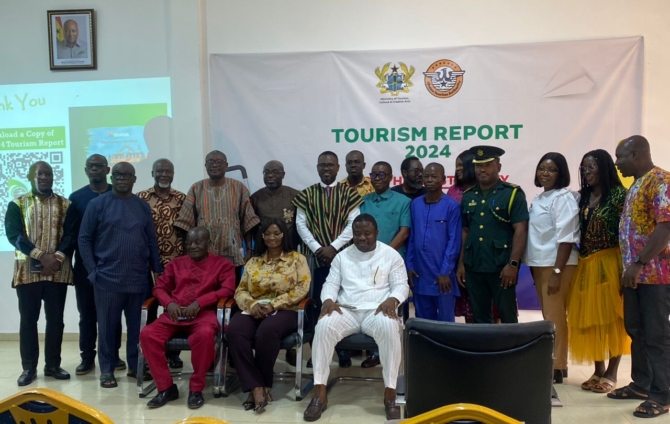Ghana’s tourism industry has recorded significant growth in 2024, with increased international arrivals, booming domestic tourism, and greater diversification of tourism offerings across the country. The Ghana Tourism Authority (GTA) has released its 2024 Tourism Performance Report, themed “Growth and Stability”, offering an in-depth look into the strides made in the sector over the past year.

According to the report, Ghana welcomed 1,288,804 international visitors in 2024, representing a 12% increase compared to the previous year. This steady rise—though slower than the 25% surge recorded in 2023—indicates sustained global interest in Ghana as a tourism destination. Notably, visitor arrivals from Nigeria alone rose by 25%, confirming Ghana’s growing popularity within the West African sub-region.
The cruise tourism segment also witnessed a major boost. A total of 14 cruise ships docked at the ports of Tema and Takoradi, bringing in 12,634 passengers—a remarkable 38% increase from 2023. The report noted that 61% of these cruise tourists were aged 60 and above, highlighting Ghana’s emerging status as a preferred stop in the West African cruise circuit. However, while visitors commended Ghana’s cultural richness and warm hospitality, the report underscored the need for infrastructural improvements to enhance tourist experiences.

Domestic tourism was equally vibrant, providing a crucial anchor for the sector. The GTA reported 1.68 million site visits by domestic tourists, a 19% increase from the previous year. Ghanaians accounted for over 85% of these visits, with the Kwame Nkrumah Memorial Park being the most visited site, attracting 20% of total visits. Interestingly, sites such as the Kalakpa Resource Reserve and the Nakore Mosque recorded higher patronage from foreigners than locals.

Several flagship festivals and events contributed to the sector’s strong performance. Cultural celebrations such as the Kwahu Easter Paragliding Festival and entertainment-filled activities under the “December in GH” banner—featuring major events like AfroFuture, Detty December, and TadiFest—were among the highlights. A survey conducted at Kotoka International Airport during the festive season revealed increased levels of visitor satisfaction, average spending, and interest in repeat visits, particularly among younger travellers and members of the diaspora.

The report also pointed to the rising influence of short-term rentals through platforms like Airbnb, which have broadened accommodation options and created income-generating opportunities for local homeowners. However, GTA officials stressed the importance of regulation and maintaining quality standards in this fast-growing sector.
Speaking at the launch of the report, Deputy Minister for Tourism, Arts and Culture, Yussif Issaka Jajah, described the document as a “mural” that reflects Ghana’s tourism progress and its role in driving job creation, private investment, and cultural pride.
“We must ensure that these achievements translate into real benefits for our people,” he said, urging continued collaboration between public and private stakeholders to build a resilient tourism ecosystem.
Acting CEO of the GTA, Maame Efua Houadjeto, emphasized that the report’s combination of data analytics and qualitative research would be critical in shaping future tourism policies and strategies.
“The report is not just numbers; it provides actionable insights that will guide our interventions, foster private-sector growth, and improve accountability,” she said.
The global tourism market is projected to grow by 3 to 5% in 2025, and Ghana is strategically positioned to harness this momentum. The GTA says its focus will remain on data-led planning, infrastructure development, inclusive growth, and branding Ghana as a top-tier tourism destination in Africa.













